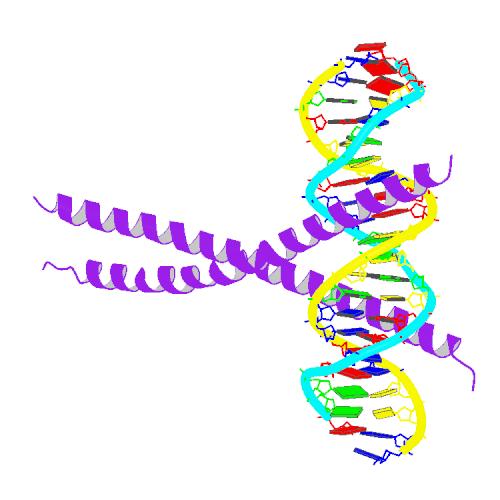CEBPA
| CCAAT/enhancer binding protein (C/EBP), alpha | |||||||||||||
|---|---|---|---|---|---|---|---|---|---|---|---|---|---|
 PDB rendering based on 1nqw. | |||||||||||||
| |||||||||||||
| Identifiers | |||||||||||||
| Symbols | CEBPA ; C/EBP-alpha; CEBP | ||||||||||||
| External IDs | Template:OMIM5 Template:MGI HomoloGene: 3211 | ||||||||||||
| |||||||||||||
| Orthologs | |||||||||||||
| Template:GNF Ortholog box | |||||||||||||
| Species | Human | Mouse | |||||||||||
| Entrez | n/a | n/a | |||||||||||
| Ensembl | n/a | n/a | |||||||||||
| UniProt | n/a | n/a | |||||||||||
| RefSeq (mRNA) | n/a | n/a | |||||||||||
| RefSeq (protein) | n/a | n/a | |||||||||||
| Location (UCSC) | n/a | n/a | |||||||||||
| PubMed search | n/a | n/a | |||||||||||
CCAAT/enhancer binding protein (C/EBP), alpha, also known as CEBPA, is a human gene.
The protein encoded by this intronless gene is a bZIP transcription factor which can bind as a homodimer to certain promoters and enhancers. It can also form heterodimers with the related proteins CEBP-beta and CEBP-gamma. The encoded protein has been shown to bind to the promoter and modulate the expression of the gene encoding leptin, a protein that plays an important role in body weight homeostasis. Also, the encoded protein can interact with CDK2 and CDK4, thereby inhibiting these kinases and causing growth arrest in cultured cells.[1]
See also
References
Further reading
- Sladek FM, Darnell JE (1992). "Mechanisms of liver-specific gene expression". Curr. Opin. Genet. Dev. 2 (2): 256–9. PMID 1638120.
- Marcucci G, Mrózek K, Bloomfield CD (2005). "Molecular heterogeneity and prognostic biomarkers in adults with acute myeloid leukemia and normal cytogenetics". Curr. Opin. Hematol. 12 (1): 68–75. PMID 15604894.
- Leroy H, Roumier C, Huyghe P; et al. (2005). "CEBPA point mutations in hematological malignancies". Leukemia. 19 (3): 329–34. doi:10.1038/sj.leu.2403614. PMID 15674366.
External links
- CEBPA+protein,+human at the US National Library of Medicine Medical Subject Headings (MeSH)
This article incorporates text from the United States National Library of Medicine, which is in the public domain.
| This protein-related article is a stub. You can help Wikipedia by expanding it. |